2017 Bucheon International Fantastic Film Festival Report
by Kyu Hyun Kim and Darcy Paquet
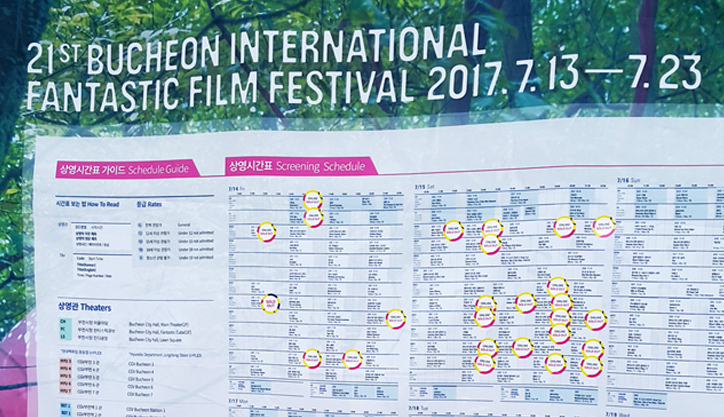
It's been many years since we have done a BiFan report on Koreanfilm.org, although our team has worked on the BiFan dailies distributed by the festival several times during the interim. It's nice to be back!
The festival itself has seen some ups and downs in its recent history, but at the moment it seems to be on solid footing. The 2017 edition is the second under the leadership of festival director Choi Yong-bae, a well-established industry veteran who produced The Host, among other works. The programming team has also been reshuffled, and their selection of films for this year has been generally well received. Special programs include a tribute to Korean actress Jeon Do-yeon, retrospectives of Spanish director Alex de la Iglesia and the late Korean director Hong Ki-seon, and a special program on 'monstrous women'.
The following report contains our personal impressions of the films and events that make up BiFan 2017 and the BiFan Industry Gathering (B.I.G.) which runs alongside the festival. Although neither one of us will be able to attend the entire festival, we'll provide as many updates as we can.
Quick links:
Two cinematic legends: Jeon Do-yeon and Alex de la Iglesia
Revisiting Jeon Do-yeon in The Contact
Surprised and delighted by Coffee Noir: Black Brown
A glimpse of the future at NAFF's It Project selection
TWO CINEMATIC LEGENDS: JEON DO-YEON AND ALEX DE LA IGLESIA (Kyu Hyun)
The rainy season is upon us, and that means it is time for the world cinema fans to welcome the 21st Bucheon International Fantastic Film Festival, held from July 13 to 23, 2017. For this round the festival has invited 289 films from 58 nations, including an extensive list of short films (many of which turn out to be discoveries) and classics of fantasy, SF and horror that will be included in various retrospectives.
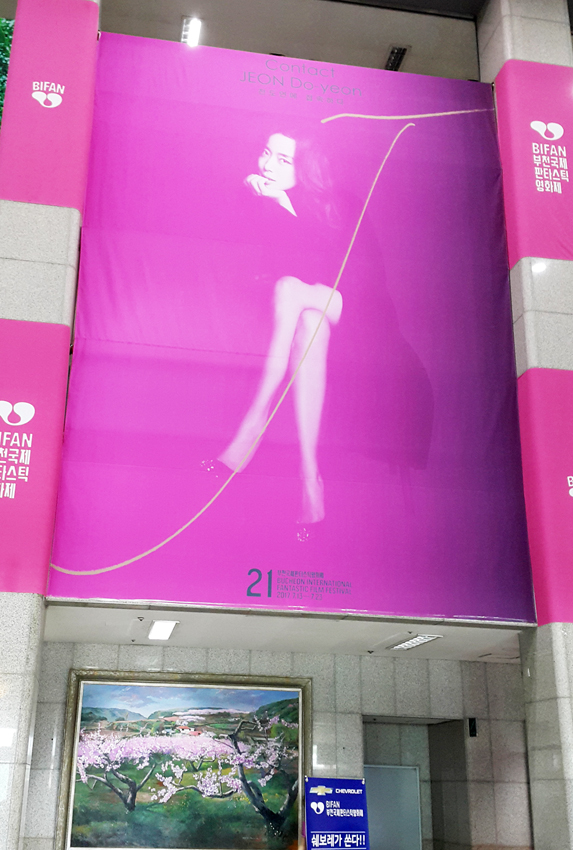 This year's retrospectives are quite strong, beginning with the screenings of Jeon Do-yeon's entire filmography, few of which are fantastical in the traditional sense, yet encompass a remarkably wide range of premises and motifs, including the futuristic Korea-to-come (as in Jeon's stunning debut, The Contact [1997]), spiritual time-travel (My Mother, the Mermaid [2004]), neo-noir glitz (No Blood No Tears [2002]), the alternative Korean past informed by foreign sensibilities (Untold Scandal [2003]), and psychological terror (the Cannes Best Actress winner Secret Sunshine [2007]). Jeon, probably the greatest New Korean Cinema actress we have had over the years, has been a veritable chameleon in all of her remarkable seventeen incarnations. Her consistent mastery of the craft of film acting and passionate commitment to her roles means that her presence in a Korean film can sometimes be the very best thing about it: she powerfully reins in the pull toward melodramatic excess in Way Back Home (2013), carefully sculpts the texture and shape into an archetypal character such as the title role in The Housemaid (2010) and adds layers of predatory cunning to a desperado femme fatale like Ha-yeon in Countdown (2011). Like Meryl Streep, she has never discriminated among genres or particular types of role, and has remained one of the Korean actors whose performance in itself constitutes a reason to seek out her latest project (even in the cases when it does not live up to her ability). Not a screen goddess in the conventional sense, Jeon is nonetheless one of the bona fide deities of New Korean Cinema and this retrospective is a fine occasion to pay tribute to her.
This year's retrospectives are quite strong, beginning with the screenings of Jeon Do-yeon's entire filmography, few of which are fantastical in the traditional sense, yet encompass a remarkably wide range of premises and motifs, including the futuristic Korea-to-come (as in Jeon's stunning debut, The Contact [1997]), spiritual time-travel (My Mother, the Mermaid [2004]), neo-noir glitz (No Blood No Tears [2002]), the alternative Korean past informed by foreign sensibilities (Untold Scandal [2003]), and psychological terror (the Cannes Best Actress winner Secret Sunshine [2007]). Jeon, probably the greatest New Korean Cinema actress we have had over the years, has been a veritable chameleon in all of her remarkable seventeen incarnations. Her consistent mastery of the craft of film acting and passionate commitment to her roles means that her presence in a Korean film can sometimes be the very best thing about it: she powerfully reins in the pull toward melodramatic excess in Way Back Home (2013), carefully sculpts the texture and shape into an archetypal character such as the title role in The Housemaid (2010) and adds layers of predatory cunning to a desperado femme fatale like Ha-yeon in Countdown (2011). Like Meryl Streep, she has never discriminated among genres or particular types of role, and has remained one of the Korean actors whose performance in itself constitutes a reason to seek out her latest project (even in the cases when it does not live up to her ability). Not a screen goddess in the conventional sense, Jeon is nonetheless one of the bona fide deities of New Korean Cinema and this retrospective is a fine occasion to pay tribute to her.
Another great retrospective is devoted to the Spanish dynamo Alex de la Iglesia, sponsored by Embassy of Spain and the Sitges International Fantastic Film Festival. Now here is one filmmaker whose disposition is such a perfect fit
to BiFan that it is a wonder that he had not already been subject to the special retrospective. Pitch-black humorous, calamitously energetic and occasionally very, very offensive, his films fairly explode with machine-gun deliveries of crazy dialogues, eyeball-melting surrealistic visuals and gross grotesqueries that are equal parts
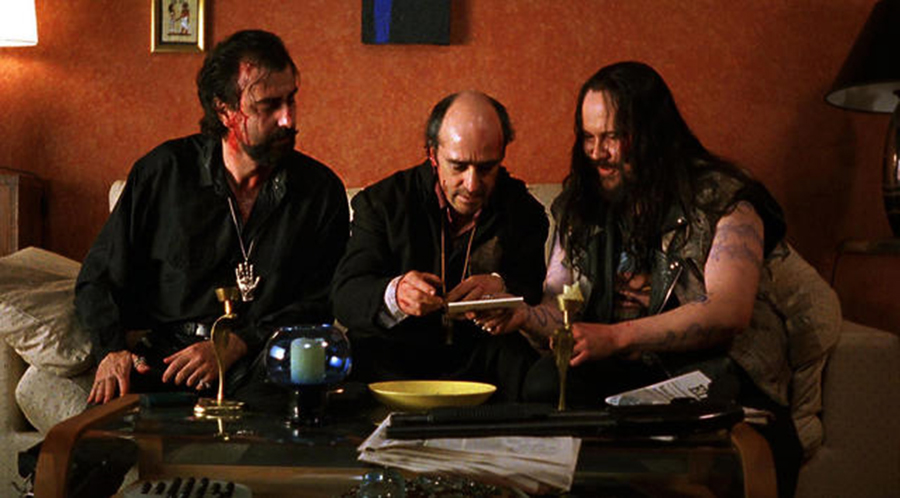 Bruegel, Francis Bacon and George Crumb. Yet, de la Iglesia is also capable of miraculously extracting the maximum amount of suspense and viewer interest out of often insanely complex narratives, chock full of high- and low- cultural references and oddly affecting observations about his usually desperate and deluded characters, whose machinations to get rich or find true love mire them ever so deeply into the tar pits of deception, chicanery, perversity and some plain weird shit. The BiFan retrospective features nine of his feature works, spearheaded by the monstrously funny but genuinely disturbing The Day of the Beast (1995) to his latest, The Bar (2017), a Quentin Tarantino-meets-Luis Bunuel thriller that proves his cojones are still tough as steel balls. The only regret is that the current retrospect does not feature Pedro Almodovar-produced debut film Accion Mutante (1993), the screen-able elements of which may well no longer exist, and his mega-controversial adaptation of the allegedly unfilmable Barry Gifford pulp insanity Perdita Durango (1997). But as compensation, the viewers at BiFan will be able to catch the director's early short film Murderous Mirindas (1991) and the documentary Heirs of the Beast (2016), made to commemorate the 20th anniversary of The Day of the Beast, which very well may be the best horror film shown in this year's BiFan.
Bruegel, Francis Bacon and George Crumb. Yet, de la Iglesia is also capable of miraculously extracting the maximum amount of suspense and viewer interest out of often insanely complex narratives, chock full of high- and low- cultural references and oddly affecting observations about his usually desperate and deluded characters, whose machinations to get rich or find true love mire them ever so deeply into the tar pits of deception, chicanery, perversity and some plain weird shit. The BiFan retrospective features nine of his feature works, spearheaded by the monstrously funny but genuinely disturbing The Day of the Beast (1995) to his latest, The Bar (2017), a Quentin Tarantino-meets-Luis Bunuel thriller that proves his cojones are still tough as steel balls. The only regret is that the current retrospect does not feature Pedro Almodovar-produced debut film Accion Mutante (1993), the screen-able elements of which may well no longer exist, and his mega-controversial adaptation of the allegedly unfilmable Barry Gifford pulp insanity Perdita Durango (1997). But as compensation, the viewers at BiFan will be able to catch the director's early short film Murderous Mirindas (1991) and the documentary Heirs of the Beast (2016), made to commemorate the 20th anniversary of The Day of the Beast, which very well may be the best horror film shown in this year's BiFan.
REVISITING JEON DO-YEON IN THE CONTACT (Darcy)
It's now been 20 years since I first moved to Seoul in 1997 to work as an English teacher. A few weeks after I arrived, a film opened in theaters that -- in contrast to most other Korean movies of the time -- had my students buzzing with excitement. It was an urban romance, but somewhat cold and unsentimental compared to other movies of its type. The protagonists felt complicated in an authentic sort of way, and the film as a whole came across as very modern. Now it is remembered as one of those works that stand at the border between "old" Korean cinema and the more youth-oriented, commercially savvy New Korean Cinema of contemporary times.
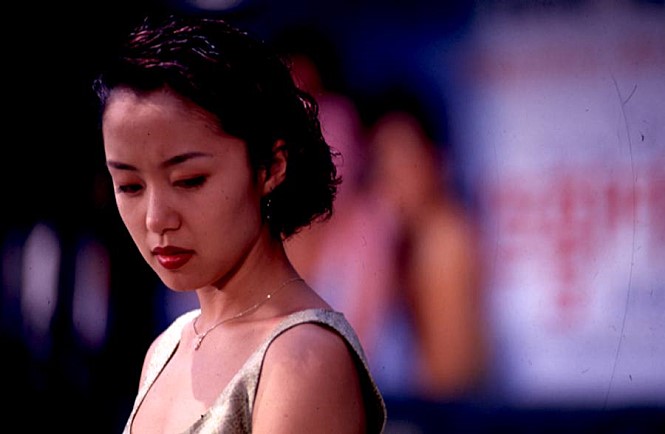 Among the reasons for The Contact's success was a debut actress named Jeon Do-yeon who would go on to become a generational icon. The warmth and immediacy of her performance impressed viewers deeply and was a big reason behind the film's commercial success. The character she plays, a call-center employee named Soo-hyun, is endearingly ordinary -- the sort of role that one can't imagine her playing now, after winning Best Actress at Cannes.
Among the reasons for The Contact's success was a debut actress named Jeon Do-yeon who would go on to become a generational icon. The warmth and immediacy of her performance impressed viewers deeply and was a big reason behind the film's commercial success. The character she plays, a call-center employee named Soo-hyun, is endearingly ordinary -- the sort of role that one can't imagine her playing now, after winning Best Actress at Cannes.
There were a number of reasons I wanted to revisit this film, which kicked off BiFan's full 17-film tribute to Jeon Do-yeon. Partly I wanted to see this performance from today's perspective, to find out if I'd view it any differently. I was also curious to know if this film still "worked". Given that much of its appeal in 1997 was its modernity (it was, among other things, Korea's first internet romance), how would the film play now that its modern touches are all dated? And finally, I suppose, there were personal reasons, given that this film captures Seoul in the same year I moved to the city. (I do remember watching films at the old Picadilly Theater, where the opening and closing scenes are set.)
In the end I was impressed that the film holds up as well as it does. The outdated technology does stand out (I had forgotten how different the sound of typing is on those old keyboards), but the characters feel more complex and convincing than the protagonists of many contemporary films. The radio producer played by Han Suk-kyu does not come across as particularly likeable (that was true back in 1997 as well), but Jeon Do-yeon is enough to carry this film. And it was illuminating to watch her performance here, to see how she imparts a quiet intensity to otherwise ordinary scenes, turning them into highlight moments.
SURPRISED AND DELIGHTED BY COFFEE NOIR: BLACK BROWN (Darcy)
It took me about 15 or 20 minutes into Coffee Noir: Black Brown before I realized just how much I was loving it. Given its unusual tone, it's hard to orient yourself at first, and to figure out exactly what you're watching. The BiFan program describes it as an "action/comedy/noir," but that's of little help. Its humor is bizarre (almost Itami-esque), but subtly delivered. It has an unusually large cast of characters with outsized personality traits. But at the same time, there's a quiet intensity to the film that sometimes catches you off guard.
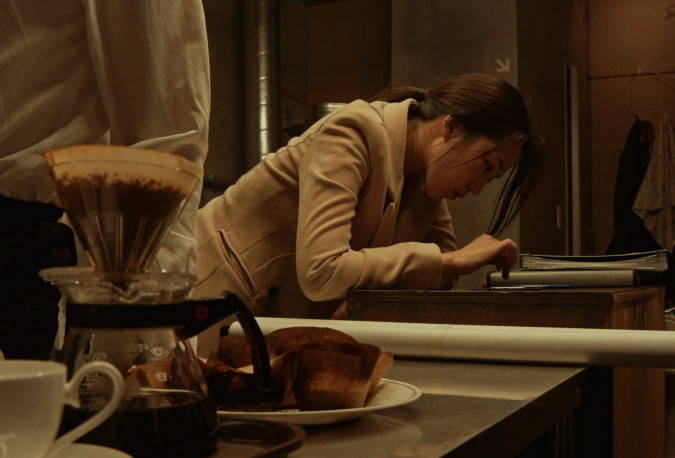 In one sense it can certainly be described as a high-concept movie. The upscale cafe Black Brown is plunged into crisis when the national government declares coffee dangerously addictive and harmful to one's health. Laws are passed to ban the substance, and a date is set after which anyone selling or drinking coffee will be harshly prosecuted. But Black Brown is serious about coffee, and has no intention of complying with unjust laws. As its menus are revamped with a selection of teas and fruit lattes, it quietly lays the groundwork for a business that will be conducted after hours, and in secret.
In one sense it can certainly be described as a high-concept movie. The upscale cafe Black Brown is plunged into crisis when the national government declares coffee dangerously addictive and harmful to one's health. Laws are passed to ban the substance, and a date is set after which anyone selling or drinking coffee will be harshly prosecuted. But Black Brown is serious about coffee, and has no intention of complying with unjust laws. As its menus are revamped with a selection of teas and fruit lattes, it quietly lays the groundwork for a business that will be conducted after hours, and in secret.
The thing is, as amusing and pointed as this satire may be, it's ultimately not the most interesting thing about the film. That distinction belongs to the main character Juwon, played (brilliantly) by Jo Soo-hyang (Wild Flowers). It's established pretty early on that she's fearsomely competent, and totally fearless. She knows how to handle just about any personality, but at the same time she's smart enough to understand when to swallow her pride in order to gain some strategic advantage. Her employees' devotion to her is obvious and unquestioned, and while watching the film, I kind of wished that I could work for her too. Unexpectedly, and in a totally serious way, the film presents a fascinating portrait of leadership.
More generally, if there's anyone who wishes to understand why South Korea will one day rule the world, one could do worse than to study the character of Juwon. (I'm joking... or maybe not?) For me she embodies the impressive and slightly alarming competence of young generation Koreans. And somehow she comes across as highly likeable at the same time.
I'm a fan of director Chang Hyun-sang's previous film Kissing Cousin, a much more straightforward story about illicit love that really stuck in my memory. How exciting that he's gone on to make a film with completely different qualities and strengths. It has its weaknesses too, and some may question his decision to turn somber towards the end, rather than push the outrageousness up another level. But already I'm excited to watch it again, and I hope he follows up on a hint dropped at the post-screening Q&A that there someday could be a sequel.
A GLIMPSE OF THE FUTURE AT NAFF'S IT PROJECT SELECTION (Kyu Hyun)
One of the most successful features of the BiFan is NAFF, Network of Asian Fantastic Films, first launched in 2008 to promote and encourage specifically horror-SF-fantasy genre productions in East and Southeast Asia. It has provided young genre filmmakers of East and Southeast Asia with rare opportunities to plug into international networks, meet like-minded people outside their own countries, attend educational programs designed to polish their production skills, and obtain crucial financial support to launch, refine and/or complete their projects. Now in its tenth year, NAFF is now looking forward to entwining its tentacles with those of similar film production networks outside Asia, such as the Sitges Pitchbox and the Nordic Genre Invasion.
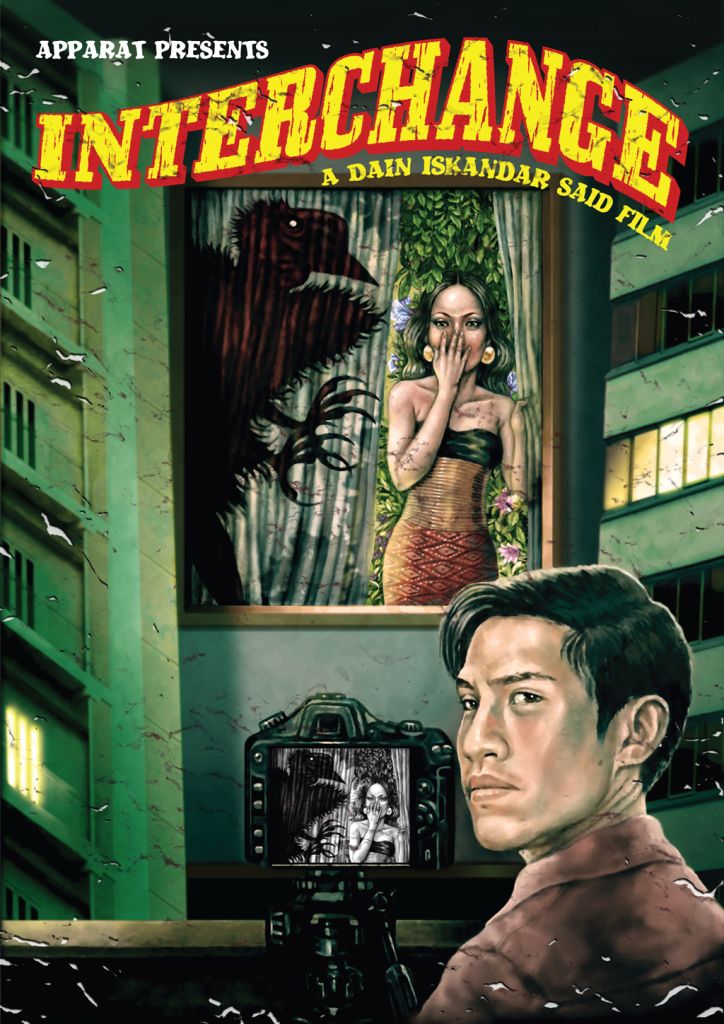 Fans of Asian fantastic cinema might be surprised to learn that some of their favorite films, such as The Raid 2: Berandal (2014), The King of Pigs (2011) and Haruko's Paranormal Laboratory (2014) have received support from the NAFF projects. In this year, two projects previously chosen for NAFF, Indonesia/Malaysian co-production Interchange (2016) and Cherry Returns (2016) have proudly unveiled their completed forms at BiFan. Given the short history of industry support for fantastic cinema, including out-and-out horror (which is still subject to many types of censorship in Asian nations), science fiction and dark fantasy, it is difficult to underestimate the significance, both actual and symbolic, of an initiative like NAFF.
Fans of Asian fantastic cinema might be surprised to learn that some of their favorite films, such as The Raid 2: Berandal (2014), The King of Pigs (2011) and Haruko's Paranormal Laboratory (2014) have received support from the NAFF projects. In this year, two projects previously chosen for NAFF, Indonesia/Malaysian co-production Interchange (2016) and Cherry Returns (2016) have proudly unveiled their completed forms at BiFan. Given the short history of industry support for fantastic cinema, including out-and-out horror (which is still subject to many types of censorship in Asian nations), science fiction and dark fantasy, it is difficult to underestimate the significance, both actual and symbolic, of an initiative like NAFF.
For the 21st NAFF It Project sessions, a total of sixteen projects were chosen among the stunning 233 entries from 39 nations. Only four among them are South Korean, indicating the ever-expanding international scope of the initiative: Spain and Czech Republic are among the nations from which the projects originate, along with Malaysia, Japan, China, the Philippines, Singapore and India. As is true with every year's It Project selections, they encompass the total spectrum of every imaginable genres other than plain dramas, from bubbly children's fantasy to a gory retro-slasher film to an explosive action thriller. For one, Netflix's Dramaworld fans might be excited to know that the cult series' main creative voice, Chris Martin, is returning to BiFan (he had participated in the NAFF Fantastic Film School in 2013) with a US-Korean co-produced feature animation tentatively called Imaginable, about an online game in which children's imaginary friends constitute their own zoological kingdom. Virtual reality also plays a critical role in the comparatively creepier The Blue Sun, a collaboration between Ko Chen Nien and Lin Shih Chieh from Taiwan. Film noir, boasting surprising plot twists and the hidden motivations of superficially "normal" characters, is well represented by China's Man of Sin, while director Venkat Amudhan's dark drama Zero unspools against the backdrop of India's Himalayan valleys, an area rarely presented on the big screen. Folk mythologies, grotesque yet beautiful, serve as inspirations for Indonesia's Marangka the Corpse Flower and Singapore's Wu-La.
From Japan, not only is Tokyo Gore Police's (2008) zany goremeister Nishimura Yoshihiro in Bucheon to launch what appears to be a variation on the theme of Aoyama Shinji's EM: The Embalming (1999), but also Miyake Kyoko, responsible for the superb (and disturbing) documentary Tokyo Idols (2017), is here with her first feature-length film project based on a controversial real-life female serial killer case (Femme Fatale). Some projects are firmly grounded in the social problems and injustices: Spain's Smiz and Pixel team has brought a scathing look at psychological manipulation through the rituals of hazing among Spanish college students in El Aspirante, and the U.S.-Hong Kong co-production Filial Betrayal. And finally, It Project would not be complete without dystopian science fiction opuses, this year represented by Malaysia's Vektor and Czech Republic's Restore Point.